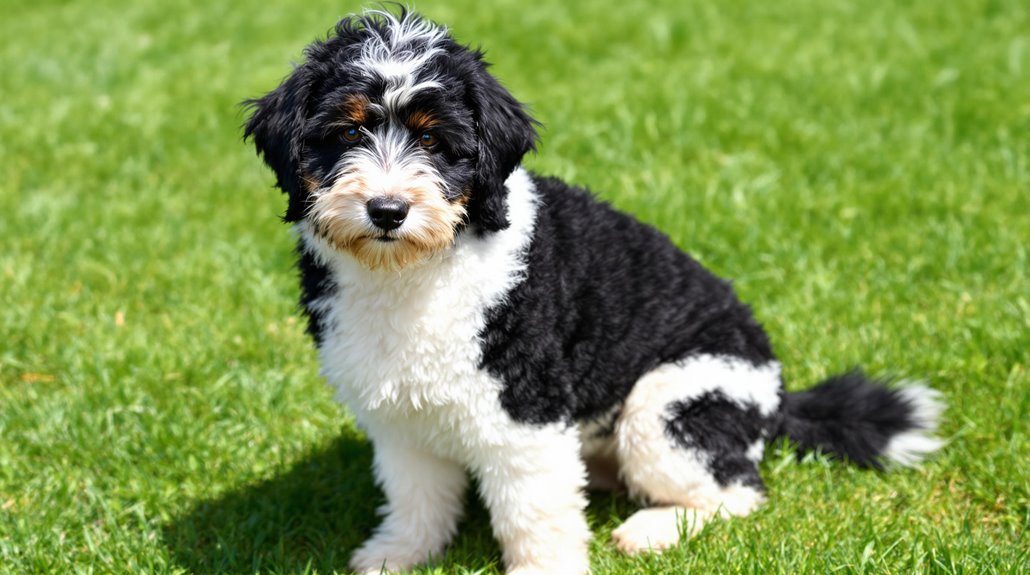A Bordoodle might be right for you if you're seeking an intelligent, active companion that combines the Border Collie's working drive with the Poodle's low-shedding coat. You'll need to commit to 30-90 minutes of daily exercise and regular grooming sessions to keep your dog healthy and happy. These designer dogs typically weigh 35-45 pounds and live 13-16 years, making them suitable for families with space and time for training. They're affectionate, good with children, and excel at activities like agility and obedience. While they're adaptable, their high energy and mental stimulation needs require dedicated owners. Understanding the breed's specific traits will help guarantee a successful match.
Understanding the Bordoodle Breed
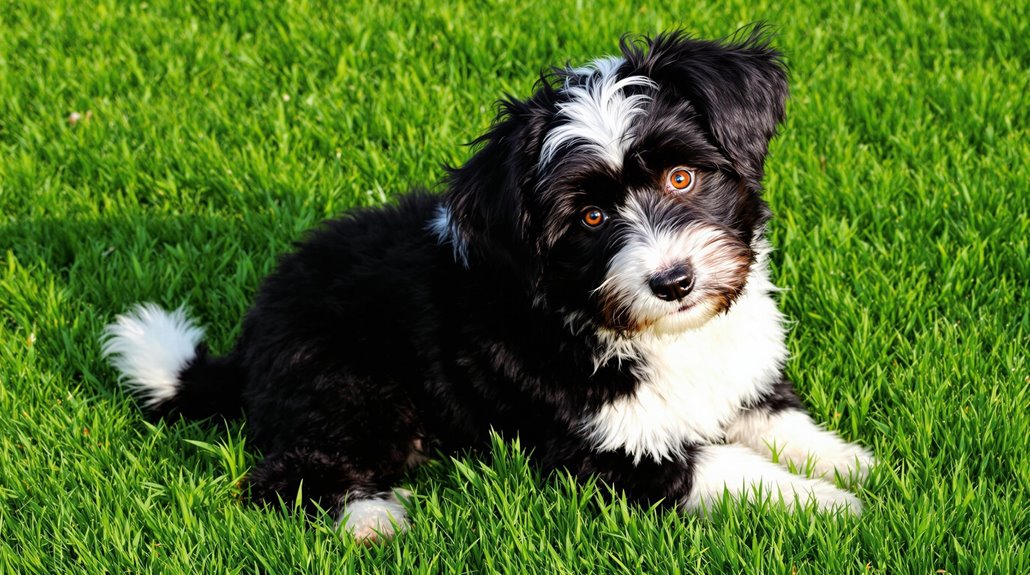
At the crossroads of intelligence and charm, the Bordoodle emerges as a fascinating hybrid breed that combines the best traits of Border Collies and Poodles. As one of the most intelligent dog breeds available, you'll find these designer dogs offer an excellent balance of mental capability and loving companionship.
When you're considering a Bordoodle, you'll encounter a range of sizes and appearances. These dogs typically stand between 15 to 26 inches tall and can weigh anywhere from 20 to 80 pounds, though most fall within 35-45 pounds. You'll notice their coats display stunning variations, including black/white, red/white, chocolate/white, and blue merle/white patterns.
Your Bordoodle will likely enjoy a healthy lifespan of 13 to 16 years, thanks to hybrid vigor that reduces their susceptibility to genetic health issues. As a blend of two highly active breeds, they'll require consistent exercise and mental engagement to thrive. You'll need to commit to regular grooming sessions, particularly if your Bordoodle inherits the Poodle's non-shedding coat type. This investment in care guarantees your intelligent companion maintains both physical and mental well-being.
Physical Traits and Characteristics
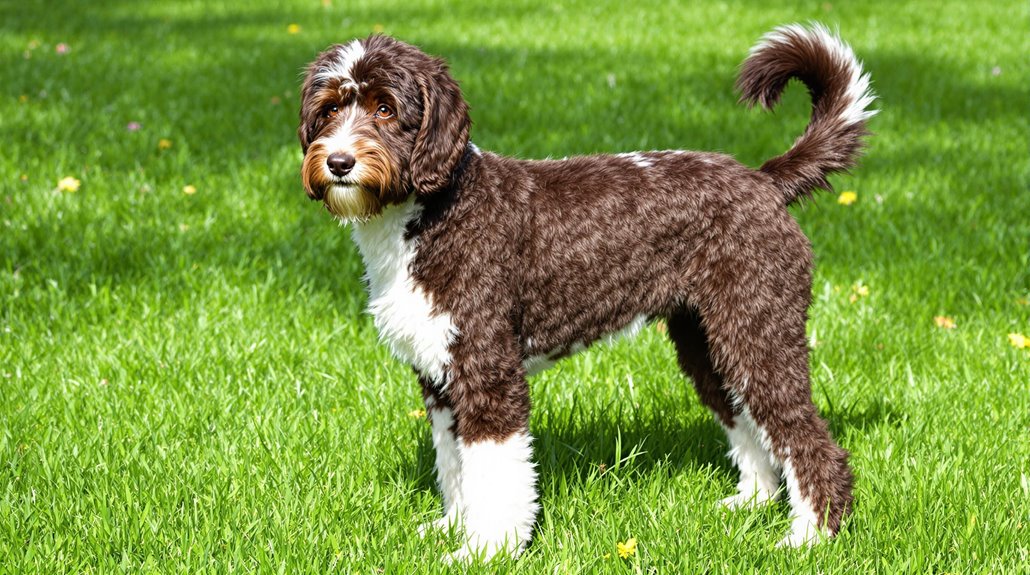
Diversity marks the Bordoodle's physical appearance, with their size ranging from medium to large depending on their Poodle parent. You'll find these dogs typically weighing between 15 to 70 pounds, though most fall into the medium-sized category of 35-60 pounds. Their height ranges from 15 to 26 inches at the shoulder, making them well-proportioned and athletic.
The Bordoodle's coat is one of their most distinctive physical traits, offering several advantages for potential owners. You'll appreciate their medium-length, wavy to curly fur that's often hypoallergenic, making them a practical choice if you or your family members have allergies. Their coats come in an array of colors, including:
- Black and white combinations
- Red and white patterns
- Chocolate and white markings
- Blue merle with white accents
- Solid color variations
One fascinating physical trait you might encounter is heterochromia – different colored eyes inherited from the Border Collie lineage. While this feature isn't guaranteed, it adds to the unique charm of these intelligent crossbreeds. You'll need to maintain regular grooming sessions to keep their coat healthy and manageable.
Personality and Temperament
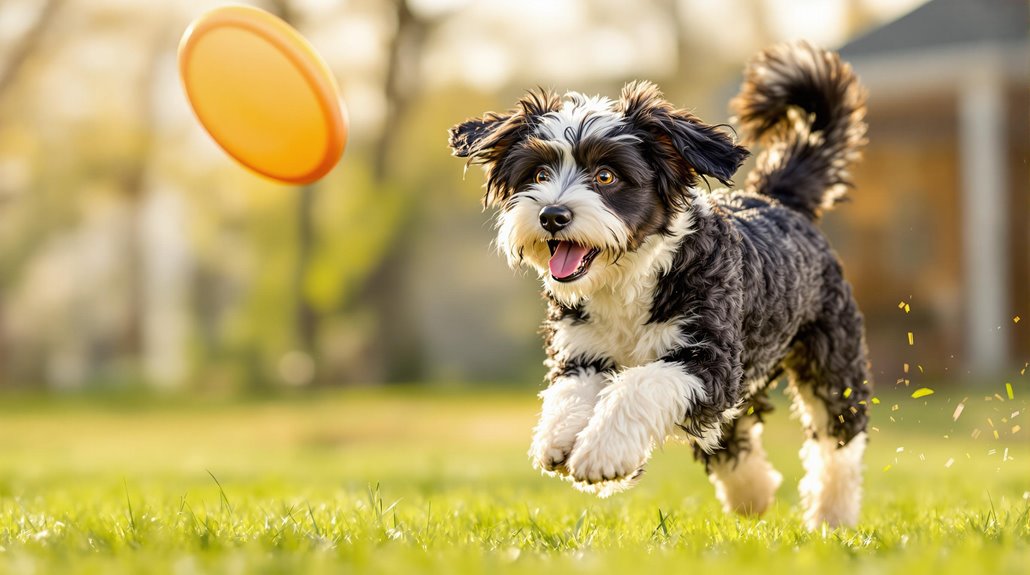
Beyond their striking physical features, Bordoodles captivate owners with their exceptional personality traits. These affectionate and loyal companions form strong bonds with their families, making them excellent additions to most households.
You'll find Bordoodles to be highly intelligent dogs who excel at learning new commands and tricks. They'll enthusiastically participate in training sessions, especially when you use positive reinforcement methods. However, you must provide them with consistent mental stimulation to prevent boredom and potential destructive behaviors.
Early socialization is essential for your Bordoodle's development. While they're naturally friendly with family members and other pets, proper exposure to different people and situations will prevent them from becoming standoffish with strangers. Here's what you can expect:
- Strong desire for human companionship
- Excellent rapport with children and other pets
- Quick learning abilities and high trainability
- Need for regular mental challenges and activities
Your Bordoodle will thrive with an active lifestyle that includes both physical exercise and mental enrichment. If you're ready to commit to their need for engagement and training, you'll find them to be devoted and intelligent companions.
Exercise and Activity Requirements
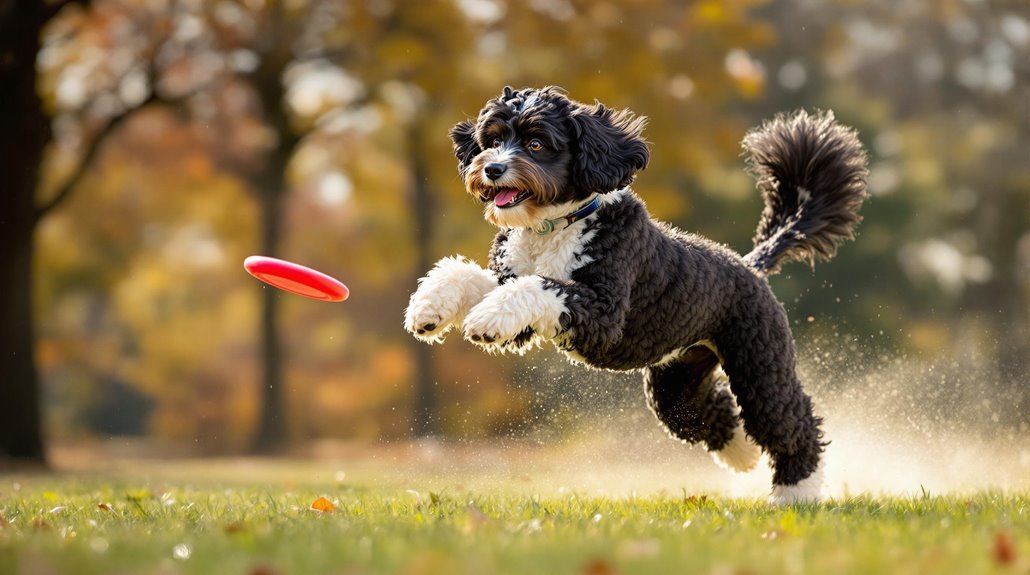
Energy runs through every fiber of a Bordoodle's being, making daily exercise an absolute necessity for these energetic dogs. You'll need to commit 30 to 90 minutes each day to keep your Bordoodle physically and mentally satisfied.
To meet your Bordoodle's exercise requirements, you can:
- Take them on long walks or jogs
- Engage in interactive play sessions
- Go hiking or swimming
- Practice agility training
- Play mentally stimulating games
If you're an active person who enjoys outdoor activities, you'll find a perfect companion in your Bordoodle. They'll happily join you for bike rides, trail runs, or extended hiking adventures, making exercise time a bonding experience for both of you.
Remember that consistent daily activity isn't just about physical exercise—it's essential for preventing unwanted behaviors that can develop from boredom or pent-up energy. Your Bordoodle's intelligence demands both physical and mental stimulation, so incorporate training exercises and problem-solving games into their routine. This all-encompassing approach to exercise will help guarantee you're raising a well-adjusted, happy, and healthy companion.
Training and Mental Stimulation
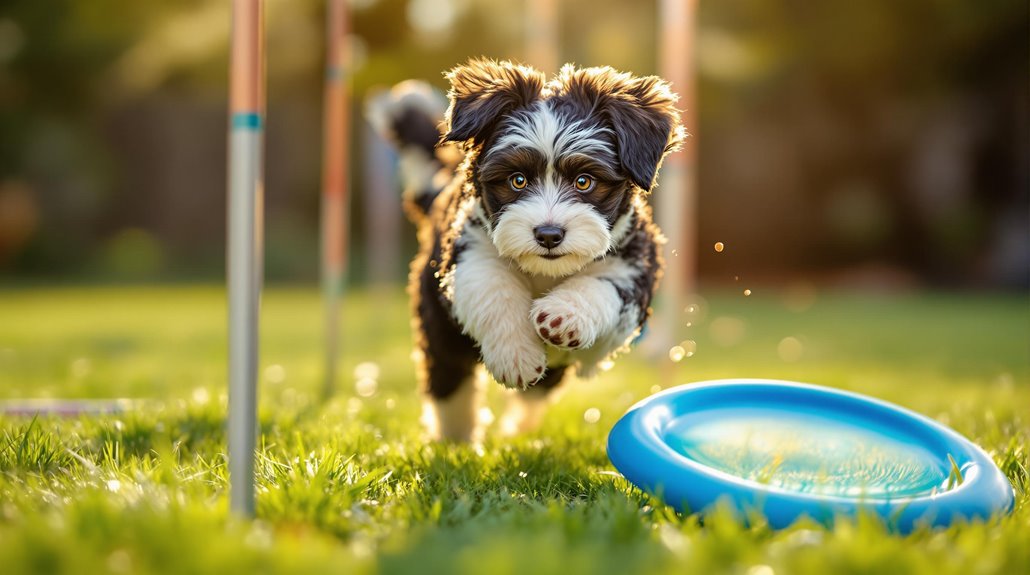
Training your Bordoodle starts with understanding their remarkable intelligence and enthusiasm to learn. You'll find these clever dogs quickly pick up commands when you use positive reinforcement techniques, rewarding their successes with treats and praise rather than harsh corrections.
To keep your Bordoodle mentally fulfilled, you'll need to:
- Provide daily training sessions to reinforce obedience skills
- Rotate interactive puzzle toys to challenge their problem-solving abilities
- Incorporate new tricks and commands into their routine
- Engage them in mentally stimulating games and activities
Consider enrolling your Bordoodle in agility classes or dog sports, as they excel in these activities. Not only will this sharpen their obedience skills, but it'll also give them the mental workout they crave.
Remember that consistency is key – without proper mental stimulation, your Bordoodle may develop unwanted behaviors. Set aside dedicated time each day for training and enrichment activities. You can prevent destructive habits by:
- Using food-dispensing toys during alone time
- Teaching advanced commands progressively
- Creating obstacle courses in your yard
- Practicing nose work exercises
Grooming and Care Needs

With their distinctive coat combining Border Collie and Poodle genetics, Bordoodles need consistent grooming attention to stay healthy and comfortable. Their grooming needs can vary based on their coat type, with wavy or curly-coated dogs requiring more intensive care to prevent matting.
To keep your Bordoodle looking and feeling their best:
- Schedule professional grooming sessions monthly
- Brush your dog's coat regularly between appointments
- Bathe only when necessary, typically after outdoor activities
- Keep nails trimmed and teeth cleaned regularly
The amount of shedding you'll experience depends on your Bordoodle's generation. F1 Bordoodles may shed moderately, while F1b Bordoodles tend to be lower-shedding options that might work better for allergy-sensitive homes.
Beyond coat maintenance, your Bordoodle requires:
- At least one hour of daily exercise
- Regular veterinary check-ups to prevent health issues
- Proper nutrition and fresh water
- Consistent dental care
Health and Life Expectancy

Thanks to their mixed heritage, Bordoodles enjoy a robust lifespan of 13 to 16 years and generally maintain good health throughout their lives. These designer dogs benefit from hybrid vigor, which often reduces their susceptibility to genetic diseases common in purebred dogs.
While Bordoodles are typically healthy, you'll need to watch for certain health concerns that can affect this mix:
- Hip dysplasia and joint problems
- Progressive retinal atrophy (PRA)
- Other inherited eye conditions
To guarantee your Bordoodle stays healthy, you'll want to:
- Schedule regular veterinary check-ups
- Maintain a proper diet and exercise routine
- Monitor for any changes in behavior or mobility
- Keep up with vaccinations and preventative care
When you're looking to bring a Bordoodle into your family, it's vital to work with reputable breeders who conduct DNA testing on parent dogs. These tests help screen for potential health issues before breeding, giving your future companion the best chance at a long, healthy life. With proper care and attention to their health needs, your Bordoodle can remain an active and vibrant family member well into their senior years.
Family and Social Dynamics
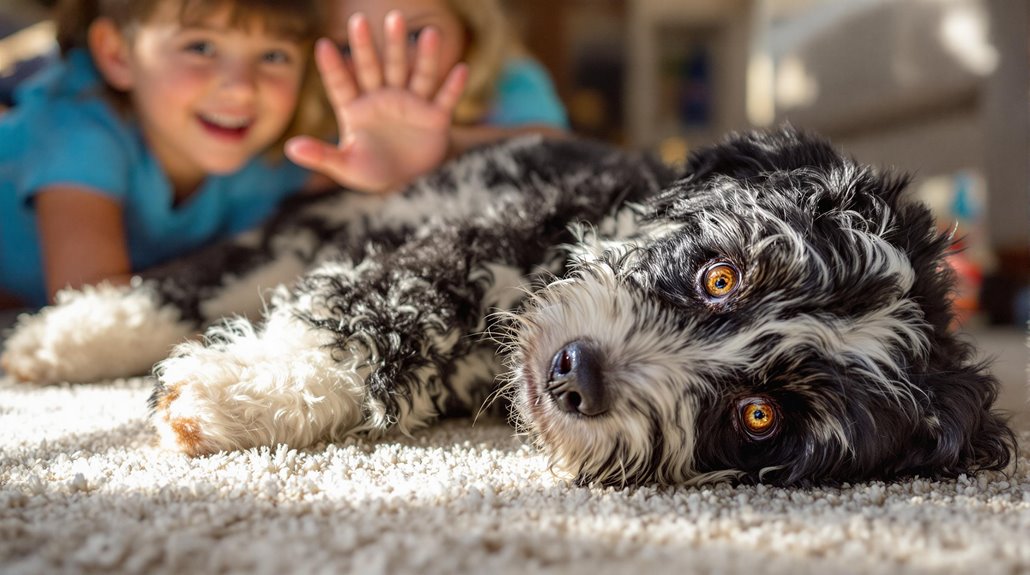
Beyond their robust health profile, Bordoodles truly shine in their role as family companions. These affectionate dogs form deep bonds with their human family members and display remarkable patience with children. Their friendly nature makes them ideal for households seeking a devoted four-legged friend.
You'll find that Bordoodles adapt well to multi-pet households, getting along splendidly with both dogs and cats. However, proper socialization during their early months is essential to develop these positive traits. Here's what you can expect:
- Natural ability to integrate into family activities and routines
- Strong desire to participate in energetic outdoor adventures with family members
- Excellent tolerance levels with children when properly trained
- Adaptability to various living situations, from houses to apartments
To help your Bordoodle thrive in your family setting:
- Provide regular exercise and mental stimulation
- Include them in family activities to prevent boredom
- Maintain consistent training and socialization
- Create opportunities for interaction with other pets and people
Remember that these intelligent dogs need active engagement from their families to prevent restlessness and maintain their well-balanced temperament.
Living Space and Environment
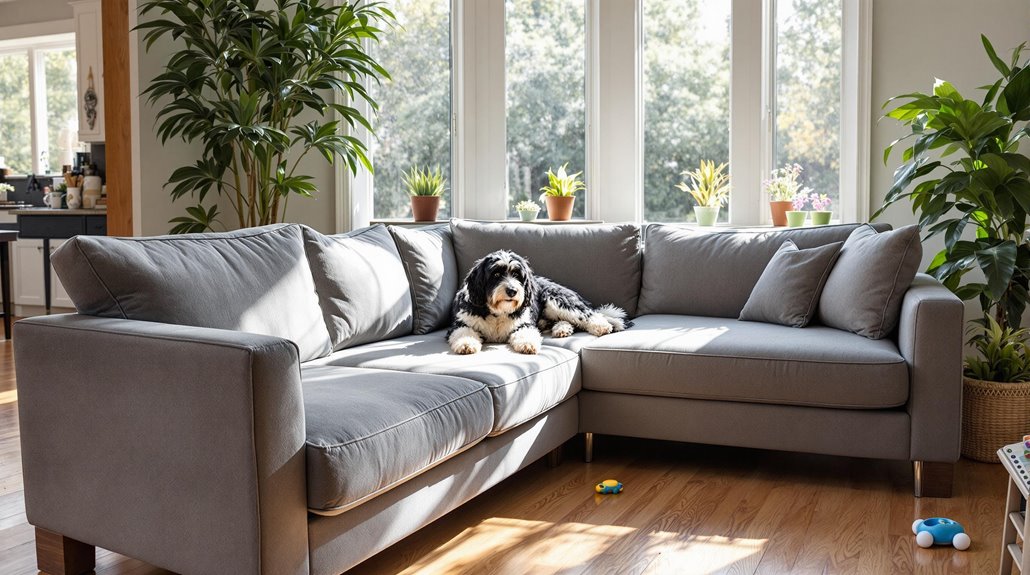
Most Bordoodles adapt remarkably well to diverse living environments, from spacious suburban homes to cozy city apartments. Your living space doesn't need to be enormous, but you'll need to guarantee adequate room for your dog to move comfortably indoors.
Key Living Requirements:
- Daily exercise: Plan for 30-90 minutes of physical activity
- Mental stimulation: Provide puzzle toys and training sessions
- Social interaction: Create opportunities for family time and play
- Outdoor access: Regular walks and outdoor adventures
Before welcoming a Bordoodle into your home, consider these environmental factors:
- Your schedule and availability for exercise sessions
- Access to parks, walking trails, or dog-friendly areas
- Proximity to other dogs for socialization opportunities
- Space for indoor play during bad weather
- Noise considerations for apartment dwellers
While these affectionate dogs can thrive in apartments, you'll need to compensate for limited space with extra outdoor activities. If you work long hours, consider arranging dog walking services or daycare options, as Bordoodles don't do well with extended periods of isolation. Regular socialization is essential, so living in an area with opportunities to meet other dogs and people is beneficial.
Finding Your Bordoodle Puppy

Ready to find your perfect Bordoodle puppy? The journey to finding your new companion requires careful research and patience, as choosing the right breeder will greatly impact your dog's health and temperament.
When searching for a reputable breeder, look for these essential qualities:
- DNA testing documentation for both parent breeds
- Health guarantees covering genetic conditions
- Clear records of hip and eye certifications
- Transparent breeding practices and facility visits
- Willingness to answer your questions
You'll likely encounter prices between $1,000 and $3,000, reflecting the breeder's expertise and the puppy's lineage. Don't be discouraged by waitlists – they're often a sign of responsible breeding practices and high demand for these lovable dogs.
Once you've found your puppy, focus on early socialization and training. Your breeder should start this process before you bring your puppy home, but you'll need to continue their development. Remember these key points:
- Begin positive reinforcement training immediately
- Expose your puppy to various environments and situations
- Establish a consistent routine
- Consider puppy classes for structured socialization
Following these guidelines will help guarantee you bring home a healthy, well-adjusted Bordoodle puppy.
Designer Crossbreed Since 1990S
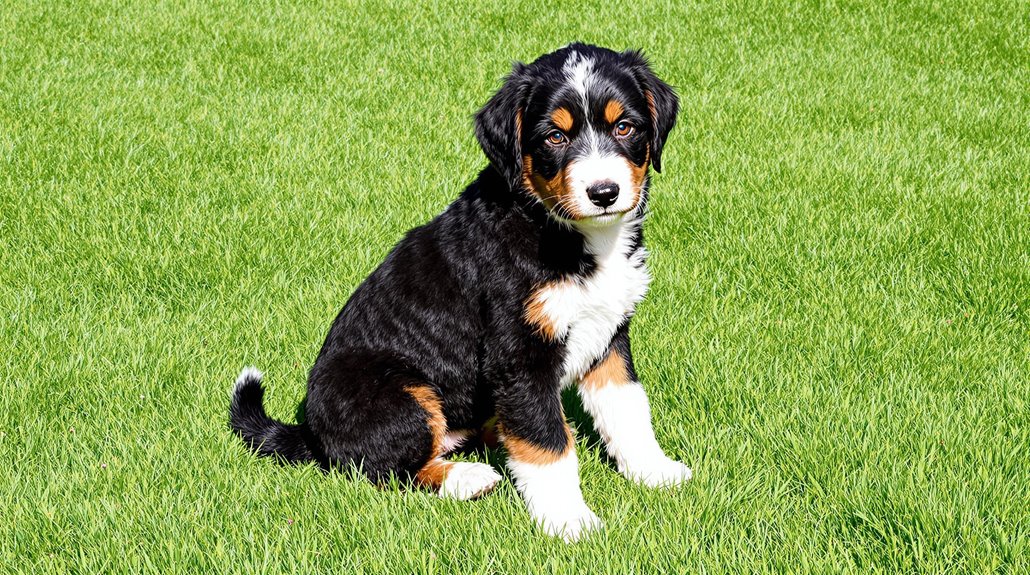
Since their emergence in the late 1990s, Bordoodles have established themselves as a sought-after designer crossbreed that combines the best traits of Border Collies and Poodles. You'll find that strategic breeding practices have helped minimize genetic health issues common in purebreds while maximizing desirable characteristics like intelligence and adaptability. Their growing popularity has led to increased recognition from various kennel clubs and breed registries, cementing their status as a legitimate designer breed option for prospective dog owners.
Early Development and Origins
While many designer dog breeds emerged in the late 20th century, the Bordoodle made its debut in the 1990s as an intentional cross between the Border Collie and the Poodle. This strategic pairing combined two breeds with remarkable histories and distinct purposes – the Poodle's background as a German duck hunting companion and the Border Collie's legacy as a skilled sheep herder in Britain.
The development of the Bordoodle reflects a broader trend in designer breeds, where breeders aim to create dogs with specific traits suited for modern family life. You'll find that this crossbreed inherits the Poodle's hypoallergenic coat, making it suitable if you're sensitive to pet allergies, while maintaining the Border Collie's legendary intelligence and work ethic.
Though not recognized by the AKC, the Bordoodle has gained significant recognition from other kennel registries over the past decade. If you're considering this mix, you should know that it represents a thoughtful combination of its parent breeds' best qualities – the Poodle's low-shedding coat and the Border Collie's loyal, energetic nature – designed specifically for companion-focused homes.
Improved Genetic Health Traits
The strategic crossbreeding of Border Collies and Poodles has led to notable health advantages in Bordoodles. Thanks to hybrid vigor, you'll find these designer dogs typically experience fewer genetic diseases than their purebred parents, making them a healthier choice for your family.
When you're considering a Bordoodle, you'll benefit from their impressive 13-16 year lifespan, which stems from the combination of robust health traits inherited from both parent breeds. Responsible breeders help guarantee this longevity by conducting thorough DNA testing on parent dogs before breeding.
Key Health Benefits:
- Lower risk of inherited genetic conditions
- Enhanced overall vigor from mixed breeding
- Reduced likelihood of breed-specific health issues
While Bordoodles can still face common health concerns like hip dysplasia and eye conditions, you can minimize these risks by working with reputable breeders who prioritize health screening. Since their establishment in the 1990s, these intelligent, low-shedding dogs have gained recognition not just for their appealing personalities, but also for their generally robust health profiles, making them excellent companions for health-conscious families.
Recognized Designer Dog Status
As a recognized designer breed, Bordoodles emerged in the late 1990s during the initial Doodle breeding movement sparked by Labradoodles. You'll find that these intelligent crossbreeds combine the best qualities of Border Collies and Poodles, creating a versatile companion that's gained significant recognition over the past decade.
While Bordoodles aren't currently recognized by major kennel clubs like the AKC, they've established themselves as a legitimate designer dog breed with a dedicated following. You'll notice their growing popularity stems from intentional breeding practices that emphasize:
- Consistent temperament traits
- Predictable physical characteristics
- Enhanced genetic diversity
- Low-shedding coats
- High trainability
If you're considering a Bordoodle, you should know that reputable breeders focus on maintaining the distinct characteristics that make this designer dog unique. They're part of a newer generation of purpose-bred dogs that aim to serve specific owner needs, from hypoallergenic qualities to exceptional intelligence.
The breed's status continues to evolve as more families discover the benefits of this Border Collie-Poodle mix, contributing to its growing recognition in the designer dog community.
Intentionally-Bred Hybrid Companion Dog
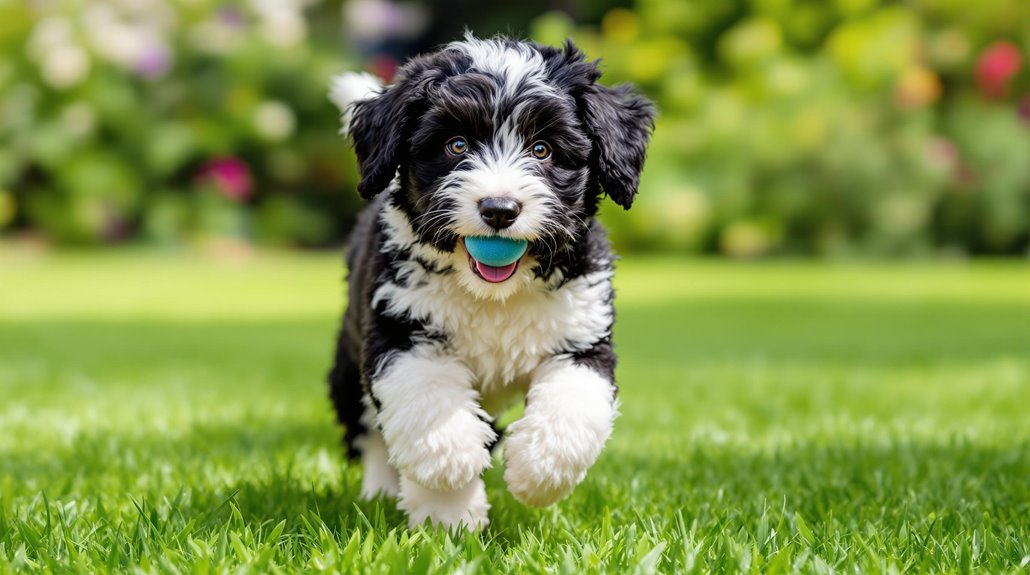
Intentionally crossing Border Collies with Poodles has created a versatile companion dog that combines the best traits of both breeds. The result is a highly adaptable Bordoodle that flourishes in various living environments while maintaining the intelligence and energy needed for an active lifestyle.
When you're considering a Bordoodle, you'll find these dogs excel in multiple roles:
- Family companionship: They adapt well to homes with children and create strong bonds with all family members
- Service work: Their high trainability makes them excellent candidates for assistance and therapy roles
- Active partnership: You'll have a ready companion for outdoor activities and sports
Your Bordoodle will inherit beneficial traits from both parent breeds:
- Poodle genetics contribute:
- Hypoallergenic coat properties
- Affectionate nature
- Reduced shedding
- Border Collie genetics provide:
- Superior intelligence
- High energy levels
- Strong work ethic
To keep your Bordoodle happy and well-adjusted, you'll need to commit to:
- Regular grooming sessions
- Daily exercise routines
- Consistent mental stimulation
- Active social interaction
These requirements guarantee your Bordoodle remains a well-balanced and fulfilled companion.
Well-Proportioned Athletic Frame
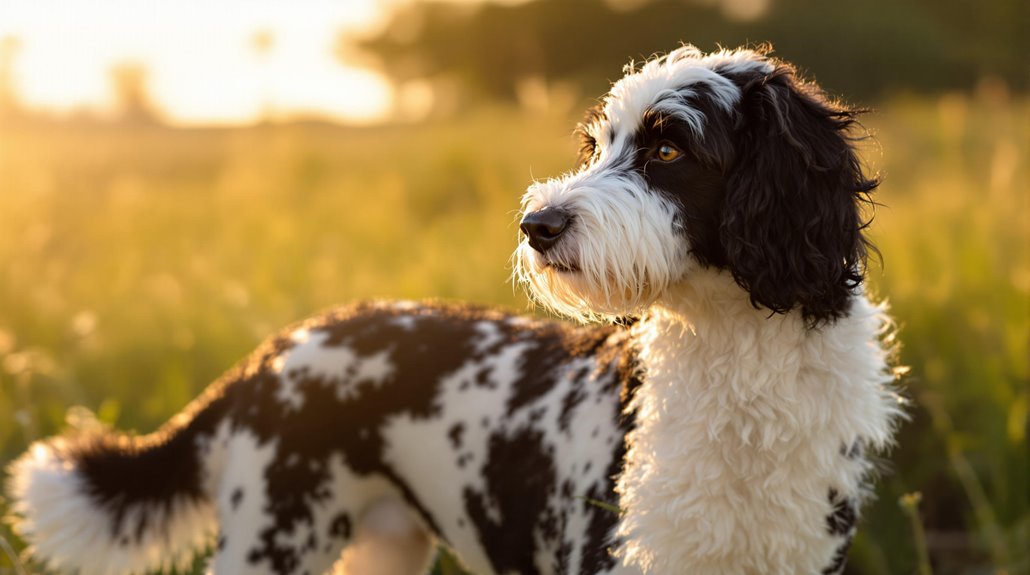
Your Bordoodle will stand between 15 and 22 inches tall at the shoulder, making them an ideal size for both indoor and outdoor activities. Their well-balanced frame comes wrapped in a wavy or curly coat that reflects both parent breeds' best physical traits. You'll need to commit to weekly brushing sessions to prevent their medium-length fur from matting and to keep their athletic build looking its best.
Height of 15-22 Inches
Standing at a height of 15 to 22 inches, the Bordoodle strikes an ideal balance between the Border Collie's agility and the Poodle's refined build. This medium-sized height makes them versatile companions that can adapt to various living situations, from apartments to homes with large yards.
You'll find that your Bordoodle's exact height will depend on whether they're bred from a Miniature or Standard Poodle parent. This variance creates flexibility in choosing a size that matches your lifestyle and space requirements. Their athletic frame at this height range supports their natural inclination for activity and exercise.
When you're considering a Bordoodle, keep these height-related benefits in mind:
- Easy to manage during training and daily activities
- Tall enough to participate in dog sports and agility
- Comfortable size for car travel and home living
- Perfect height for interaction with children and adults
- Suitable for both indoor and outdoor activities
This height range positions Bordoodles as excellent family companions, offering you a dog that's neither too small to keep up with active pursuits nor too large to manage comfortably in your home.
Wavy or Curly Coat
A distinguishing feature of the Bordoodle is its wavy or curly coat, which complements its well-proportioned athletic frame. This coat type, inherited from its Poodle parent, offers potential hypoallergenic traits that can make these dogs suitable for families with allergy concerns.
You'll find Bordoodles sporting a variety of stunning coat colors, including:
- Black and white combinations
- Chocolate and white blends
- Blue merle patterns with white accents
Your Bordoodle's medium-length coat will require consistent maintenance to keep it healthy and mat-free. You'll need to commit to regular grooming sessions, including:
- Monthly professional grooming appointments
- Weekly brushing at home
- Regular coat checking for tangles
It's important to note that your Bordoodle's coat type may vary depending on which parent breed's genetics are more dominant. Some dogs will display more Poodle-like curls, while others might show the Border Collie's wavy texture. This athletic breed's coat supports their active lifestyle, providing protection during outdoor activities like hiking and swimming while maintaining a practical, manageable length with proper care.
Weekly Brushing Prevents Matting
Regular brushing sessions form the cornerstone of Bordoodle coat maintenance, protecting their athletic frame from uncomfortable matting and tangles. You'll need to commit to weekly grooming, as their medium-length, curly coat requires consistent attention to stay healthy and manageable.
The frequency of your grooming routine will depend on your Bordoodle's specific coat type:
- F1 Bordoodles (first-generation mix):
- May experience moderate shedding
- Require brushing at least once weekly
- Need extra attention during seasonal changes
- F1b Bordoodles (backcross generation):
- Usually have non-shedding coats
- Need more frequent brushing to prevent matting
- Benefit from twice-weekly grooming sessions
Your Bordoodle's active lifestyle means they'll collect dirt and debris during exercise and play. After outdoor activities, you'll want to check their coat for tangles or foreign objects. By maintaining a regular brushing schedule, you're not just preventing matting—you're also:
- Supporting healthy skin condition
- Promoting a lustrous coat appearance
- Reducing the risk of skin problems
- Creating opportunities for bonding with your dog
Eager-To-Please Working Hybrid

Your Bordoodle's exceptional problem-solving abilities and enthusiasm to learn will make training sessions both productive and rewarding for you both. You'll need to commit about two hours daily to exercise and mental stimulation to keep your intelligent companion from becoming bored or restless. Their natural affinity for structured activities means they'll readily adapt to your family's routines, particularly when it comes to keeping up with active children and their schedules.
Quick Problem-Solving Capacity
Bordoodles' exceptional intelligence shines through their remarkable problem-solving abilities, making them one of the most capable mixed breeds in training and task completion. Their quick problem-solving skills allow them to master complex commands efficiently, while their enthusiastic-to-please nature makes training sessions productive and engaging.
You'll find that early socialization combined with consistent positive reinforcement helps channel their natural intelligence into practical applications. These highly trainable dogs excel at:
- Learning new commands in fewer repetitions
- Adapting to different training methods
- Understanding complex task sequences
- Responding to subtle cues and gestures
When you're working with a Bordoodle, you'll notice their intuitive grasp of situations and remarkable ability to anticipate needs. Their inherited work ethic from both parent breeds means they'll stay focused during training sessions and remain committed to completing assigned tasks.
To maximize their potential, you'll need to:
- Provide regular mental challenges
- Maintain consistent training schedules
- Incorporate variety in learning activities
- Reward problem-solving successes
- Balance physical exercise with mental stimulation
Great With Kids' Routines
When it comes to family life, a Bordoodle's natural willingness to please makes it an exceptional companion for households with children. Their ability to learn quickly helps them adapt to the structured routines that families often establish, making daily activities smoother for everyone involved.
Bordoodles excel as great companions for children through their:
- Patient and tolerant nature when interacting with kids
- Adaptability to different play styles and energy levels
- Intelligence that helps them understand appropriate behavior around children
- Natural instinct to protect and watch over family members
These dogs thrive in active play scenarios, making them perfect partners for:
- Backyard games and fetch sessions
- Family walks and outdoor adventures
- Interactive training exercises that include children
- Supervised playtime that builds bonds between kids and pets
For families with children looking for a dog that'll fit seamlessly into their lifestyle, Bordoodles offer an ideal combination of traits. They're energetic enough to keep up with active kids yet gentle enough to be trusted around younger family members, creating a balanced dynamic that works well in family settings.
Needs 2 Hours Daily Exercise
Thanks to their working dog heritage, Bordoodles require a substantial commitment of 90 minutes to 2 hours of daily exercise to stay happy and well-behaved. As a mix of the energetic Border Collie and intelligent Poodle, they've inherited a strong drive to stay active and engaged throughout the day.
You'll need to incorporate various activities to meet your Bordoodle's exercise needs:
- Daily walks or jogs (at least 45 minutes)
- Interactive play sessions with fetch or frisbee
- Mental stimulation exercises
- Agility training or obstacle courses
- Swimming (if available)
If you're considering a Bordoodle, you must be ready to maintain this exercise schedule consistently. Without proper physical activity, these dogs can develop unwanted behaviors like excessive barking, digging, or destructive chewing. The good news is that you'll find them highly adaptable to different exercise routines as long as you meet their daily requirements.
For active individuals or families who enjoy outdoor activities, you'll appreciate how easily your Bordoodle will keep pace with your lifestyle, making an excellent companion for hiking, running, or playing sports.
Annual Vet Check Requirements

Your Bordoodle will need yearly vet check-ups to monitor potential issues like hip dysplasia and guarantee they stay healthy throughout their 11-16 year lifespan. You'll want to schedule regular dental cleanings as part of their preventive care routine, since dental health impacts their overall wellbeing. These annual visits allow your vet to catch any developing health concerns early, giving you the best chance at successful treatment and a long, active life with your mixed-breed companion.
Hip Dysplasia Needs Monitoring
Due to their mixed heritage from Border Collies and Poodles, Bordoodles can inherit a predisposition to hip dysplasia, making regular veterinary monitoring vital. You'll need to schedule annual check-ups to catch any developing joint issues early, as symptoms often progress gradually over time.
To guarantee your Bordoodle's hip health:
- Schedule yearly OFA testing as recommended by veterinary professionals
- Maintain your dog's healthy weight through proper diet and exercise management
- Watch for signs of discomfort, such as difficulty rising or reluctance to climb stairs
- Consult your vet immediately if you notice changes in your dog's mobility
Your role in monitoring your Bordoodle's hip health is essential, as early detection can greatly improve treatment outcomes. Keep detailed records of your dog's weight, exercise tolerance, and any mobility changes you observe between veterinary check-ups.
Remember that excess weight puts additional stress on your dog's joints, so maintaining an appropriate diet and exercise routine isn't just about fitness—it's vital for protecting your Bordoodle's hip health throughout their life.
2-15 Year Typical Lifespan
Through proper care and regular veterinary attention, Bordoodles can enjoy a lengthy lifespan of 13-16 years. As a dedicated pet owner, you'll need to commit to annual vet check-ups that guarantee your dog's ongoing health and well-being.
Your Bordoodle's regular vet visits should include:
- Thorough physical examinations
- Core vaccinations and boosters
- Dental health assessments
- Parasite prevention treatments
- Screening for breed-specific conditions
During these check-ups, your vet will monitor for common health concerns that can affect your Bordoodle's lifespan, including joint issues and progressive retinal atrophy. They'll also provide guidance on maintaining a balanced diet that supports your dog's health needs at different life stages.
To maximize your Bordoodle's years with you, establish a consistent healthcare routine:
- Schedule annual wellness exams
- Keep vaccination records current
- Monitor weight and exercise levels
- Address health concerns promptly
- Maintain dental hygiene
Following these preventive health measures won't just extend your Bordoodle's life – it'll help guarantee those years are healthy and active. Remember, early detection through regular vet visits is key to managing potential health issues effectively.
Regular Dental Cleanings Essential
Among the most important aspects of your Bordoodle's annual check-ups, dental cleanings play an essential role in maintaining their overall health. Your veterinarian will perform detailed dental assessments to catch potential issues early, preventing more serious complications down the road.
Bordoodles need special attention to their dental care because of their compact mouth structure, which can make them prone to dental disease. Like regular grooming, dental maintenance should become part of your routine care schedule. Here's what you need to know:
Key Dental Care Requirements:
- Schedule professional cleanings during annual check-ups
- Brush your Bordoodle's teeth several times per week
- Provide dental treats designed for small-to-medium breeds
- Monitor for signs of common health problems like bad breath or bleeding gums
Poor dental hygiene can lead to serious health complications affecting your dog's heart, kidneys, and other essential organs. By maintaining a consistent dental care routine, you'll help prevent these issues before they start. Remember that professional cleanings, combined with at-home care, provide the best defense against dental disease and contribute to your Bordoodle's long-term well-being.
Regular Nail Trimming Needed

Keeping up with your Bordoodle's nail care is an essential part of their overall health routine. Regular nail trimming guarantees your dog's comfort and prevents potential injuries that can affect their daily activities. You'll need to make this grooming task a priority every 3-4 weeks, though some dogs may need it more frequently based on their lifestyle.
To maintain proper paw health and create a positive experience, follow these key steps:
- Use proper dog nail clippers or grinders designed specifically for canine grooming
- Establish a consistent schedule to help your Bordoodle become comfortable with the routine
- Watch for signs of overgrown nails, such as clicking sounds on hard floors
- Trim small amounts at a time to avoid cutting into the quick
Annual Food Expenses: $800-1000
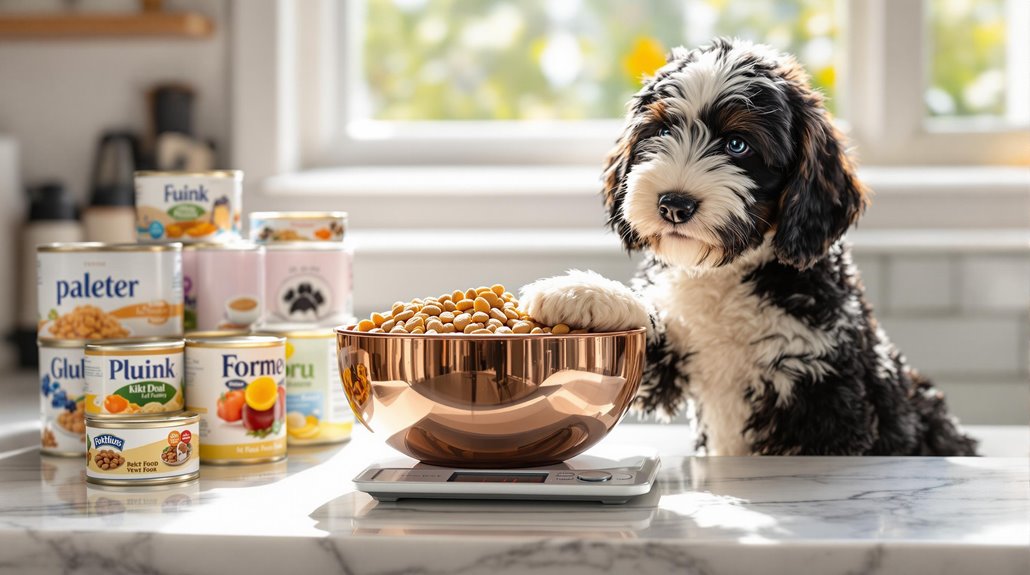
Budgeting for your Bordoodle's annual food expenses requires careful consideration, with costs typically ranging from $800 to $1,000 per year. Your furry friend will need about 2-4 cups of high-quality dog food daily to maintain ideal health and energy levels.
| Food Type | Monthly Cost | Annual Cost |
|---|---|---|
| Basic Premium | $65-75 | $780-900 |
| Grain-Free | $75-85 | $900-1020 |
| Organic | $80-90 | $960-1080 |
| Raw Diet | $85-95 | $1020-1140 |
| Prescription | $90-100 | $1080-1200 |
When planning your Bordoodle's nutrition budget, you'll need to factor in treats and supplements, which can add $100-200 to your annual expenses. Regular vet check-ups will help determine if your dog's dietary needs are being met through their current food choices.
Consider these factors when budgeting:
- Quality level of daily food
- Special dietary requirements
- Treat and supplement costs
- Potential dietary adjustments based on age and health
- Consultation fees for nutritional advice
Investing in proper nutrition now can help prevent health issues later, making those annual food expenses a worthwhile investment in your Bordoodle's long-term wellbeing.
Contact Verified Breed Clubs
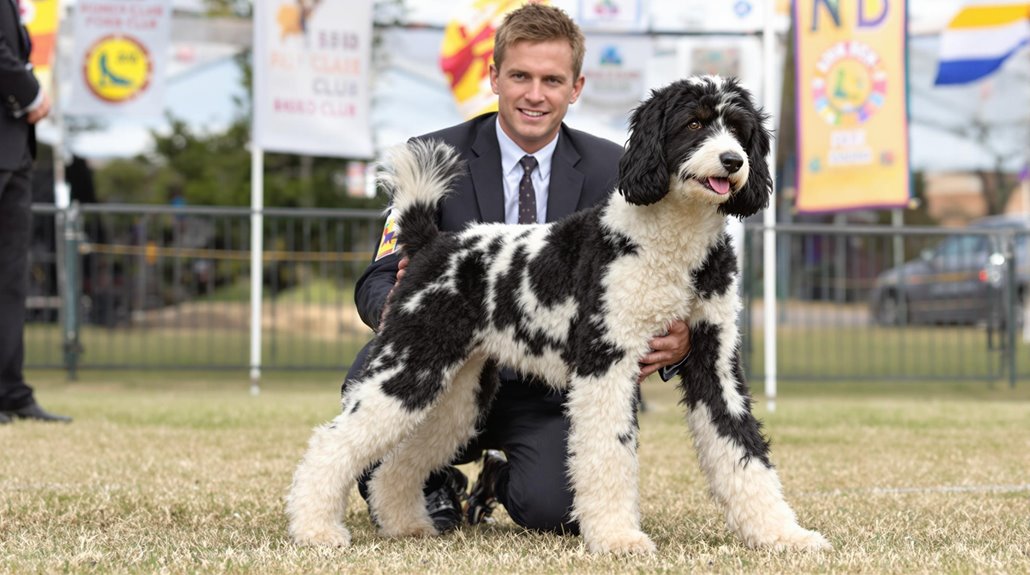
Beyond planning your Bordoodle's nutritional needs, connecting with verified breed clubs offers invaluable support for both prospective and current owners. These organizations serve as essential resources for understanding this unique Border Collie-Poodle mix.
When you reach out to breed clubs, you'll gain access to:
- Detailed information about health testing requirements and genetic screening protocols
- Current breeding standards that responsible breeders follow
- Specific temperament traits to expect from well-bred Bordoodles
- Connections with experienced owners who can share practical advice
These clubs help you make informed decisions by:
- Providing referrals to reputable breeders who prioritize responsible breeding practices
- Offering educational materials about proper care and training methods
- Organizing community events where you can meet other Bordoodle enthusiasts
- Maintaining support forums for ongoing guidance
You'll also benefit from the clubs' expertise regarding hybrid vigor, as they can explain how this mixed breeding can potentially reduce certain health issues common in purebred lines. Their knowledge base helps you understand what to expect from your Bordoodle's unique combination of Border Collie and Poodle traits.
Do Bordoodles Need Crates

While crates aren't strictly necessary for Bordoodles, they can be invaluable tools for both training and providing your pet with a secure personal space. A properly sized crate creates a den-like environment where your Bordoodle can feel safe and protected, especially during times of stress or when you're away.
If you're considering crate training your Bordoodle, you'll want to introduce it gradually and make it a positive experience. Here's what you should know:
- The crate can help prevent destructive behaviors when you're not home by giving your Bordoodle a secure space rather than free run of the house
- Use treats and praise to create positive associations with the crate, making it a place your dog wants to be
- Your Bordoodle's crate should be large enough for them to stand, turn around, and lie down comfortably
Remember that crates shouldn't be used for punishment. Instead, think of them as your Bordoodle's personal sanctuary. When properly introduced, most Bordoodles adapt well to crate training and often seek out their crate for comfort and relaxation, particularly when they need a break from household activities.
Frequently Asked Questions
Is a Bordoodle Right for Me?
A Bordoodle could be right for you if you're ready for dedicated Bordoodle care and consistent training. You'll need to commit 30-90 minutes daily for Bordoodle exercise to keep your pet healthy and engaged. Regular Bordoodle grooming is essential due to their unique coat. If you can provide an active lifestyle, mental stimulation, and have time for a 13-16 year commitment, this intelligent and affectionate breed might be your perfect match.
What Are the Cons of a Bordoodle?
You'll need a personal trainer's stamina to keep up with a Bordoodle! Here are the main drawbacks you should consider:
- High grooming requirements with daily brushing and regular professional grooming
- Intense energy levels demanding 30-90 minutes of daily exercise
- Training challenges due to their intelligence and potential stubbornness
- Possible separation anxiety if left alone too long
- Health issues inherited from both parent breeds, including hip problems and eye conditions
When these factors don't align with your lifestyle, it's best to explore other breeds.
What Is the Best Behaved Doodle Breed?
Based on training techniques and temperament, Bordoodles consistently rank among the best-behaved Doodle breeds. You'll find they excel in obedience due to their high intelligence and enthusiasm to please. While all Doodles can be well-behaved with proper socialization tips and training, Bordoodles' Border Collie heritage gives them an edge in learning commands and routines. However, you'll need to meet their significant exercise requirements and grooming needs to maintain their exemplary behavior.
What Is the Temperament of a Borderdoodle?
Like a ray of sunshine wrapped in fur, your Bordoodle's temperament combines intelligence with boundless affection. You'll find they're highly energetic dogs who need plenty of physical and mental stimulation. They're naturally social and thrive on family interaction, but they'll need consistent socialization from puppyhood. You'll appreciate their keen-to-please attitude during training sessions. When properly exercised and engaged, they're loving, gentle companions who fit perfectly into active family lifestyles.
Conclusion
You'll find that a Bordoodle isn't just another designer breed – it's a significant commitment that requires careful consideration. With their high intelligence, exercise demands, and grooming needs, they're best suited for active owners who can dedicate time to training and socialization. While these Border Collie-Poodle mixes make loving family pets, you'll need to assess your lifestyle, space, and resources before bringing one home. They're not for everyone, but for the right owner, they're exceptional companions.
